Vivid Discussions and Exchanges on STEM and Open Schooling for Sustainability Education
by Michiel Doorman, Utrecht University
The MOST final conference was part of ETE IV, the fourth edition of the Educating the Educators conference series, and devoted to open schooling for sustainability education. The ETE IV conference (May 11-12, 2023 in Leiden, Netherlands) was hosted by Naturalis Leiden and Utrecht University in collaboration with the International Centre for STEM education. More than 200 teachers, teacher educators and other interested people took part in several workshops, short orals, interactive poster session and a materials market. The innovative Naturalis Biodiversity Centre, which showcases the beauty and richness of nature in its galleries, and the spectacular architecture of the building provided an inspiring setting for the conference.
The MOST final conference consisted of a keynote by Marta Romero Ariza (University of Jaén) on evaluation results of the MOST project, the Policy Seminar and the International MOST fair, to share findings from the project and discuss opportunities for the challenges that our current society faces.
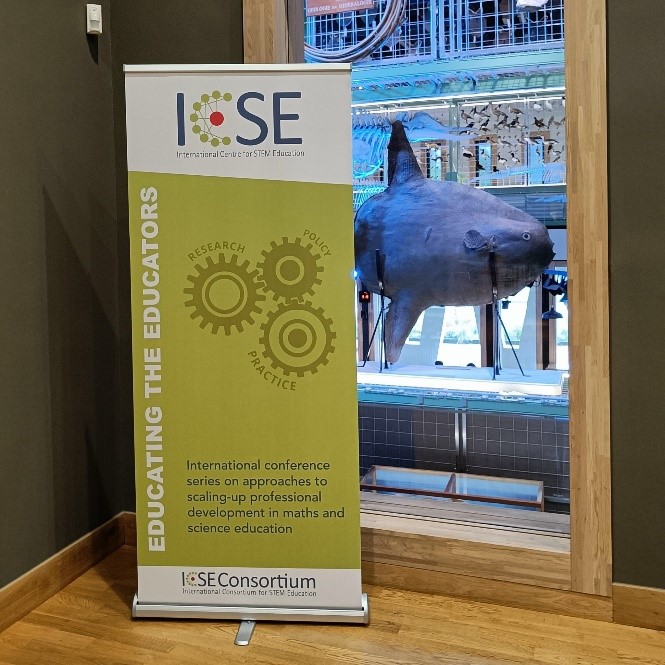
The conference at Naturalis
ETE IV Opening speech: Learning our way out of systemic global dysfunction: Rethinking STEM education in the Capitalocene
The ETE IV conference was opened with a plenary contribution by Arjen Wals on a Whole School Approach to realize quality education that is relevant, responsible, re-imaginative and hopeful in light of urgent global challenges. Wals is Professor of Transformative Learning for Socio-Ecological Sustainability at Wageningen University. He also holds the UNESCO Chair of Social Learning and Sustainable Development. His starting point was the current situation on our earth, which is becoming more and more polluted and aware of climate change. He posed some critical questions to the audience:
- What is considered sustainable? How sure are we?
- How to move beyond ‘add-on’ cosmetic sustainability towards critical and lived sustainability?
- How much space for interaction, co-creation and joint learning is available?
- Whose voices (globally) are being included or silenced?
- What qualities, competences and knowledges do people and planet need today for today and for the future?
- What are appropriate educational approaches, methods, designs, tools to use, given the kind of challenge and conditions identified?
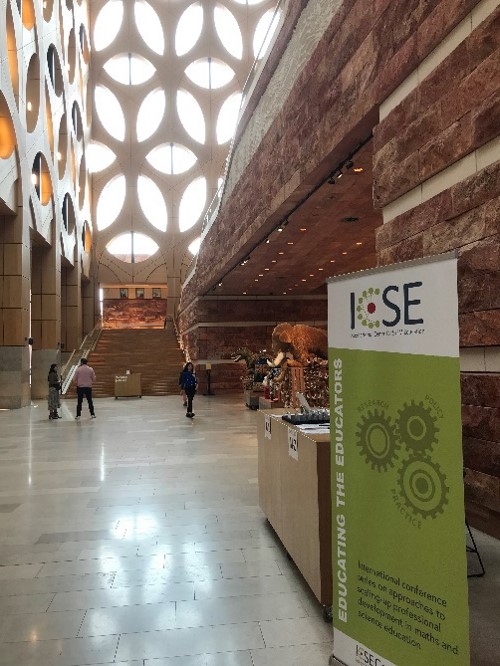
The conference at Naturalis
He concluded with the following advice based upon a whole school approach:
- Create spaces where learners can experientially investigate existential issues rooted in their life-world and local environment while being mindful of the bigger picture
- Promote and support a systems approach – e.g. by linking with SDGs – also as a subject-matter teacher – ‘whole subject approach’
- Rethink teaching in light of the competencies and qualities that matter in light of the global challenges at hand
- Utilize diversity and multiple perspectives – looking for synergy but also for contestation and conflict – ‘the difficult middle.’
- Replace a culture of fear and powerlessness with a pedagogy of hope, space for action and an ethic of care
MOST key note: School-community-projects as Keys to Sustainability Education in the STEM Domains
Marta Romero Ariza from the University of Jaén (ES) presented findings from the MOST project on how school community projects (SCP) can look like, what learning opportunities they provide, and how they can be used to tackle environmental issues in the neighborhoods of schools. She started with the following questions:
- Are we equipping future citizens with what they need?
- Are we hearing all the voices? Are we engaging everyone or are we loosing talents?
- Are we seeding creativity, inspiration and co-creation?
She outlined how SCPs within the MOST project became projects that arise from students’ interests in relation to their community’s needs, and enabled them to investigate local problems related to waste and energy in cooperation with experts, companies, associations. An important characteristics of this process are co-design and aiming at development of sustainable solutions, while meaningfully applying STEM knowledge and skills. She gave examples from the MOST project that illustrated how SCPs might look like. Next she addressed the challenge of evaluating the impact with pre- and post-questionnaires for all participating students and teachers, and more in-depth case studies from participating countries:
- What are the characteristics of good SCP and the main barriers for a successful implementation?
- How are SCP perceived by participants (teachers, students and community members?
- What kind of STEM learning takes place and how do SCP help students to understand environmental problems and their role in solving them?
With the results from the questionnaires and the case studies, she provided insight into the benefits of the SCPs for tackling environmental issues. Two quotations:
“SCP gave students an opportunity to flourish by allowing them the opportunity to talk to each other, reach a compromise, see things, experience, make mistakes and learn from their mistakes” (Maltese teacher)
“It is always wonderful to see how proud students can be of their sustainability projects. And not only them. After planting the shrubs and trees isolating the traffic one mother said: Thanks to the children there will be reduction of air and noise pollution and it enhances aesthetic appeal of the area. Every green brunch helps” (Czech teacher).”
She finalized with emphasizing the importance of co-creation for finding sustainable solutions. In this process schools can become hubs of social transformation and community well-being, such that schools empower our students and prepare them to become future agents of change.
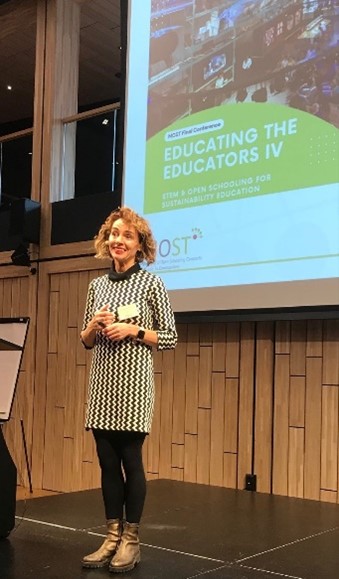
Plenary event: Marta Romero Ariza (University of Jaén)
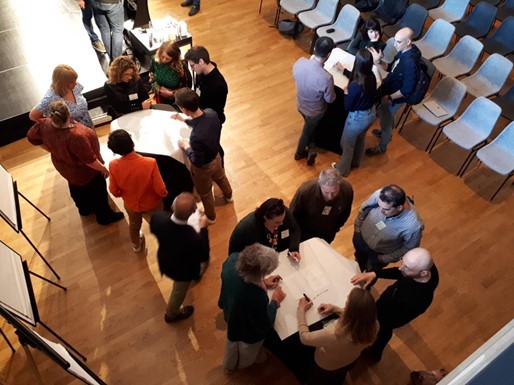
Participants discussing open schooling at the MOST policy seminar
The MOST policy seminar
The MOST Policy seminar focused in more detail on what teachers need to integrate participatory projects such as Open Schooling activities into the classroom on a regular basis. The seminar had two parts: The first part included presentations of Giuseppe Mossuti, European Schoolnet; Antonio Quesada, MOST project, University of Jaén, and Tobias Feitkenhauer, Initiative Schule im Aufbruch. The second part included a World Café on the following questions:
- What do teachers need to integrate Open Schooling activities into their lessons? What are the challenges and how to overcome them?
- How can actors in the education sector contribute to pave the way for Open Schooling activities in the curriculum?
The discussions in small groups led to several conclusions. A promising approach for a high-performing school of the future is to open up school education and let society learn with and from each other: In the European MOST project, schools were supported to open the doors of their classrooms to work on projects in real-life contexts in collaboration with community members. In these participatory projects, participants tackled an environmental challenge relevant to their community and brought their respective expertise to the problem-solving process. Here, the schools get involved in the community, the participants experience themselves as self-effective and learn with and from each other. Although educational systems constantly must face societal changes, they often seem to be less flexible, when it comes to spontaneously adapting to these changes. Therefore, it is desirable to establish a particular space within the curriculum or lesson tables of schools to provide opportunities to open up schools. In doing so, open schooling can become a driving force of institutional change.
The International MOST fair
At the international MOST fair students and their teachers presented 18 school community projects from 9 countries. In the MOST project, students and their teachers collaborated with their communities (families, science education providers, citizens, businesses etc.). Together they worked on environmental issues with a thematic focus on waste management and energy saving. These participatory projects directly responded to the needs and values of those involved, benefitting the community as a whole and making schools agents of community well-being. Teachers, students and SCP-leaders presented posters, gave pitches, showed materials and video’s or carried out an experiment for an audience of conference visitors in a lively atmosphere. Especially the exchange between students from different countries was great to see.
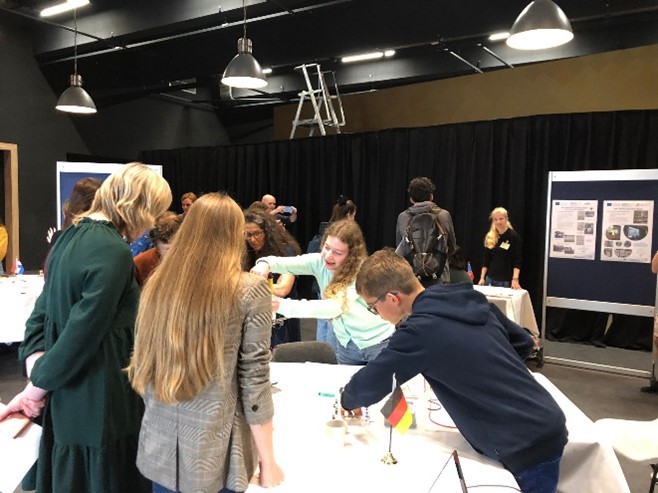
Participants at the MOST fair
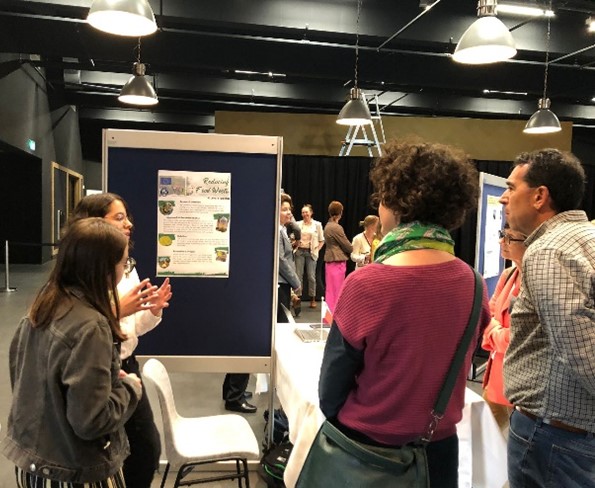
Participants at the MOST fair
The evaluation showed that visitors very much valued the presentations and also the conversations with students, teachers and other people involved in the SCPs. They were also happy with the way it was structured to encourage interactions and fruitful exchange of experiences to move beyond only walking around and passively looking at the various posters.
When asked what aspect of the fair they liked best, many visitors appreciated the participation of the students.. Teachers rated the international MOST Fair as a very good opportunity to disseminate their SCPs. Meeting others who have done similar projects and sharing good practices and stories were highly appreciated. . The students also appreciated meeting students and teachers from other countries, exchanging ideas and discovering commonalities: “They were also students like me that wanted to help their school. And they were very dedicated too, ” one student participant recalled.
Recommendations from participants included suggestions like:
“Maybe invite people that can actually make all the plans and ideas happen in more places or cities or even countries.”
“I have no improving for the Most Fair. It was just great, specifical the moderation and how they taught us to share our projects/ connect with each other etc. Please keep that!”
ETE IV Panel discussion: How do we envision education-oriented communities to stand up for sustainability
The MOST project was also presented in many ways in workshops, paper and poster presentations as well as in the materials market of ETE IV, whichenabled colleagues to share classroom materials for the implementation of innovative projects in the spirit of the theme of the conference.
The conference closed with a plenary panel discussion on the question: How do we envision education-oriented communities to stand-up for sustainability? The contributions from the panelists illustrated the possibilities for interdisciplinary ways of working and gave advice on how to overcome challenges in classroom practice such as:
- Emphasise the importance of climate education comprehensively (beyond a chapter in a geography textbook)
- Adopt a perspective of action that is necessary and can prevent depression, powerlessness and fatalism
- Teachers: not neutral but transparent
- Give students a voice in curriculum design & educational practices/projects! It is their future.
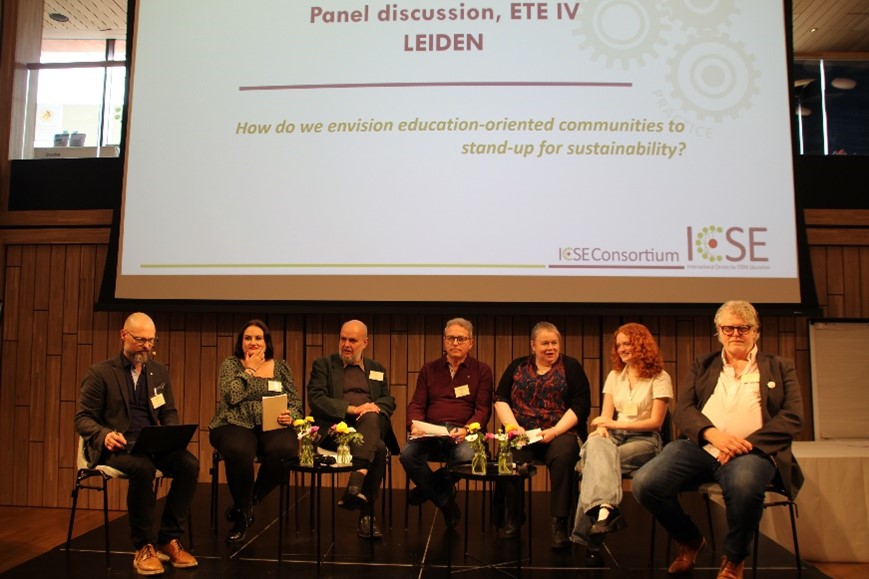
Panel Discussion
